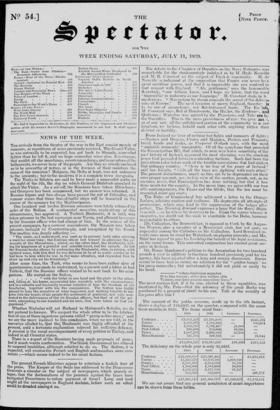NEWS Or THE WEEK.
THE arrivals from the theatre of the war in the East consist merely of rumours, or repetitions of news previously received. The Grand Vizier, as was naturally to be expected, has got back to Shumla, somewhat lighter than he left it, and we hope somewhat wiser also. It is strange, that amidst all the marchings, countermarchings, and rencontres of the belligerents, we never hear of the people. Are they so utterly enslaved as to be unworthy of notice, or is the fewness of their numbers the cause of the omission? Bulgaria, the Delta at least, was not unknown to the ancients ; but to the moderns it is a complete terra incognita.
The Turks in Silistria are said to have made a successful sortie on the night of the 5th, the day on which General Diebitsch marched to attack the Vizier. As a set-off, the Russians have taken Hirschova; and Giurgevo has been summoned, but no answer was returned. A Russian frigate and two sloops have passed the gut of Gibraltar, and rumour states that three line-of-battle ships will be launched in the course of the summer for the Mediterranean.
One hundred and twelve Russian prisoners were lately released by order of the Sultan. A sentimental narrative, explanatory of this circumstance, has appeared. A Turkish Bimbaschi, it is said, was taken prisoner in the last campaign near Varna, and allowed to escape by the Russian officer who had charge of him. In the corn-se of the present campaign, by a carious coincidence, the Russian waa taken prisoner, brought to Constantinople, and recognized by his friend. The meeting was deeply affecting :— "The scene, as I understood, was such as to prevent both sides uttering a word for some time ; the Russian officer lost himself in admiring the ge- nerosity of the Mussulman ; whilst, on the other hand, the Bimbaschi, feel- ing the happiness of a grateful and sensible heart, lost his speech. At last the Russian broke silence by embracing the Bimbaschi, who, in return, with agitated voice, told him that he was desirous to be of as much service as he had been to him while he was in the same situation, and requested him to cheer up and rely on his friendship."
After some time, the Turk, who seems to have been rather slow of apprehension, was made to understand, by a present and a letter in had Turkish, that the Russian officer wished to be sent back to his com- panions. He waited on the Sultan,
. . . . . . " with the letter in one hand and the plate in the other, and, falling at his knees, acquainted him minutely with the circumstance, and in a suitable and becoming manner solicited of him the freedom of his benefactor, together with his five companions. The Sultan was highly pleased to hear the narrative of what happened, and wishing forcibly to im- press into the hearts of his people the sentiment of gratitude, not only con- sented to the deliverance of the six Russian officers, but that of all the pri- vates, amounting to one hundred and six men, that were taken in that en- gagement."
Whether Nicholas will act Richard to Mahmood's Saladin, we do not pretend to foresee. We suspect the whole affair to be the fabrica- tion,of one of those ingenious persons called " penny-a-line-men ;" and we are the more inclined to this conclusion, when we are told, in the narrative alluded to, tat the Bimbaschi was highly offended at the present, until a fortunate explanation relieved his suffering delicacy. present is the usual accompaniment of every petition in Turkey, and indeed in all Oriental states. - There is a report of the Russians haying made proposals of peace, but it much wants confirmation. The Greek Government has refused to suspend hostilities, although solicited to do so. The Sultan, it is expected, will receive_the French and English ambassadors sans cere- mon2e ;—which seems indeed to be his usual fashion.


















